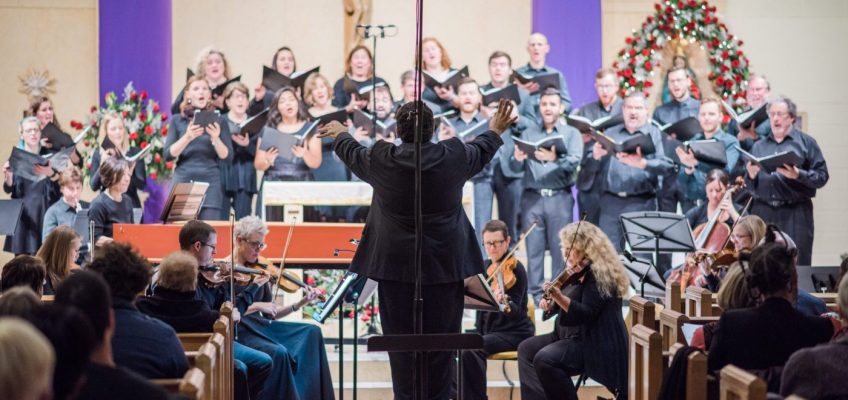Growing up in Ciudad Juarez, Mexico, some of Ahmed Anzaldúa’s earliest musical memories involve sitting at home, listening to recordings of — what else? — composer Johann Sebastian Bach’s monumental 18th-century Brandenburg Concertos.
Yes, he said, he’s been a “Baroque music nerd” his whole life.
In classical music today, many composers from the Baroque era, roughly 1600 to 1750, remain well-known names — at least, the European ones do, like Bach, Vivaldi and Handel. But what about Manuel de Zumaya or Ignacio de Jerusalem in Mexico? Or Teodora Ginés in Cuba? Or Hernando Franco in Guatemala, or Tomás de Torrejón in Peru?
Ahmed Anzaldúa, pictured in 2019, is a musician, conductor and the founder of St. Paul-based choral ensemble Border CrosSing. Anzaldúa, who grew up in Mexico, holds a doctoral degree in music from the University of Minnesota. (Photo courtesy Border CrosSing / Eric Mueller)
Thanks to Border CrosSing, an organization Anzaldúa launched in St. Paul in 2017, choral music by Latin American composers — both from the Baroque era and the present day — is making it to the stage.
“The really wonderful thing about music, capital-M Music, is its capacity to connect people through time, through geographical borders, through situations or ideology,” Anzaldúa said. “If you play a piece of music, you’re connecting with the people that composed it, even if it was hundreds of years ago or thousands of miles away, and you’re connecting with the other people that are listening to it right now.”
On Dec. 7 and 8, the group’s professional choral ensemble is presenting a juxtaposition of “Navidad Nuestra,” a 1964 work by Argentine composer Ariel Ramírez, alongside a selection of Baroque-era music from Latin America in the poetic villancico style. The shows, conducted by Anzaldúa, will feature both Andean and European-style instruments such as the panflute-like zampoña, harpsichord, the string instrument charango, recorder and violin.
Showtimes are 7 p.m. Saturday, Dec. 7, at Academia Cesar Chavez School on the East Side (1801 Lacrosse Ave.) and 4 p.m. Sunday, Dec. 8, at Church of the Ascension in North Minneapolis (1723 Bryant Ave N.) Tickets are available at BorderCrosSingMN.org or at the door.
Some composers of Latin American Baroque music were European-born missionaries who moved to their countries’ overseas colonies, and others came from Indigenous backgrounds. And in the music itself, you can hear the processes of cultural negotiation, oppression and pushback that characterize the colonial period and perhaps today’s society, too, Anzaldúa said.
“(The music) tells interesting stories about colonization, about indigeneity, about the European encounter with the Americas; things we just don’t hear about a lot on the classical music stage,” he said. “They sound unique and surprisingly modern, because they combine these European elements of harpsichords and violins with Indigenous instruments and rhythms and drums and flutes and languages.”
And these pieces, as one might expect, are not easy to find. Many Latin American Baroque compositions were never formally published in the Western canon and are rarely, if ever, performed. Anzaldúa himself has a doctoral degree in music from the University of Minnesota and works with a cadre of other scholars in Bolivia, Peru and elsewhere to search for and transcribe manuscripts.
This mission, to make particularly Latin American choral music more easily accessed and appreciated, defines all aspects of Border CrosSing’s work, Anzaldúa said. In addition to the 24-member professional choral ensemble, the organization also encompasses a community choir, plus recording and publishing operations.
“The whole idea of the group started with me trying to push back against ugly narratives of Latin American immigrants — but what am I replacing those narratives with?” he said. “It isn’t just about saying immigrants are not whatever you want to say, but who are we? What am I telling you about us that will open your way of thinking?”
For him, the answer came into focus around the time of the 2016 election, four years after his Mexican-Egyptian family had moved to the U.S. amid rising cartel violence in Ciudad Juarez, he said. At a time when he saw Hispanic and Arab immigrants continue to be demonized and belittled, he said, Latin American Baroque music felt like a powerful reminder of the scale and grandeur that cultures like his can achieve.
“You’ll see a billion conspiracy theories and History Channel specials about, Did aliens build Macchu Pichu or the Easter Island statues?” Anzaldúa said. “You’re never going to see that about Notre Dame or the Coliseum. So just the fact that we’re presenting amazing, beautifully performed music written by brown people in Latin America in the 1600s, 1700s, just pushes a little bit at that specific narrative.”
If You Go
What: The choral ensemble Border CrosSing presents “Navidad Nuestra,” a 1964 Christmas work by an Argentine composer, paired with rarely performed Latin American music from the 1600s and 1700s.
When & Where: 7 p.m. Saturday, Dec. 7, at Academia Cesar Chavez School in St. Paul (1801 Lacrosse Ave.) and 4 p.m. Sunday, Dec. 8, at Church of the Ascension in North Minneapolis (1723 Bryant Ave N.)
Tickets: $30 for adults, $25 for seniors, $20 for students, free for those under 18. Pay-what-you-can tickets are also available. Purchase online at or at the door.
More information: Call 651-237-2120 or visit BorderCrosSingMN.org
Related Articles
Melissa Etheridge and Indigo Girls to share the bill at the Minnesota State Fair Grandstand
Concert review: Cyndi Lauper charms Target Center on her farewell tour
Headliners announced for winter concert series at Como Zoo’s Sunken Garden at Marjorie McNeely Conservatory
Football early signing Day: East Ridge’s Kyle Frendt went from freshman quarterback to Division-I tight end commit
East Ridge’s Luke Ryerse, one of nation’s top punters, signs with Gophers


Leave a Reply